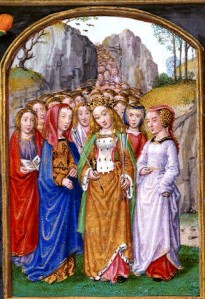 Gender: Feminine
Gender: Feminine
Origin: Latin
Meaning: “little she-bear; she-cub; little female bear.”
Eng (ERS-uh-LAH)
The name is of Latin origin but is suggested that is may be a latinization of the old Germanic female name Yrsa meaning “bear” and was popularized by a medieval Christian saint said to be martyred in Cologne. Not much is known about the saint, other that she was martyred under Huns along with 11,000 other virgins, which is now believed to be a misprint from the written source of the legend. What is known for sure is that there was a basilica built in honour of a virgin Christian martyr in Cologne and from this arose several different legends referring to a St. Ursula and St. Cordula. According to the legend, St. Ursula was a British princess who was sent by her father to Germany to marry a prince, along with her, were sent 11,000 maidens, however, her ship was taken off course due to a storm and instead ended up in France where she then decided to do a pan-European Christian pilgramage before meeting her future husband. She made a pilgramage to Rome where she tried to pursuade the pope to do a pilgramage with her and her 11,ooo companions. When she reached cologne she and her companions were massacred by the Huns.
The legend is based off of a 4th century inscription written in the Basilica which was built in the saint’s honour. It is believed that the 11,ooo handmaidens was confused with a female martyr named Undecimilia, Undecimila or Xemilia and that the abbreviation XI.M.V was misread as a number. The same saint has also been referred to under the names Pinnosa or Vinnosa. The name was quite prevalent in Great Britain before the Reformation and went out of usage afterwards. The name is also borne by Swiss actress Ursula Andress (b. 1936). It has also appeared in popular culture as the name of the evil sea-witch in Disney’s the Little Mermaid and as the name of the wife of Nigellus Phineas Black in the Harry Potter Series.
In Poland, the name is associated with a great piece of Polish Literature written by Jan Kochanowski. Known as Laments (Treny) 1580, they are a series of 19 elegies which talk about the author’s grief after the death of his two and half year old daughter Orszola (Urzula) which he refers to as the Slavic Sappho.
Other forms of the name are (divided alphabetically by nationality):
- Orsula (Corsican)
- Uršula (Croatian/Czech/Slovakian/Slovenian)
- Yrsa (Danish/Faroese/Icelandic/Norwegian/Swedish)
- Orsel (Dutch)
- Ursule/Ursuline (French)
- Ursula/Ursel (German/Dutch/Estonian/Finnish/Spanish: German diminutive forms are Ulla, Uli and Uschi)
- Orsolya (Hungarian: or-SHOH-lah was the 56th most popular female name in Hungary in 2006)
- Úrsúla (Icelandic)
- Orsina/Orsola/Orsolina (Italian)
- Ursa (Latin)
- Urzula (Latvian)
- Uršulė (Lithuanian)
- Urszula/Orszola/Warszula (Polish: Latter two forms are older forms and are rarely used. Diminutive form is Ula and Urszulka. Older diminutive forms are Ulicha and Ulita)
- Úrsula (Portuguese)
- Ursetta/Ursina/Urschla (Romansch)
- Urška (Slovenian: originally a diminutive now used as an independent given name, it was the 51st most popular female name in Slovenia in 2005)
- Orscheli (Swiss-German: ORSH-lee)
There are a few male equivalents which include:
- Orso/Orsino/Ursio/Ursino (Italian)
- Urs (German)
- Ursinus/Ursus (Latin)
- Ursyn/Ursycjusz (Polish: very rare)
- Ursin/Urosin (Romansch)